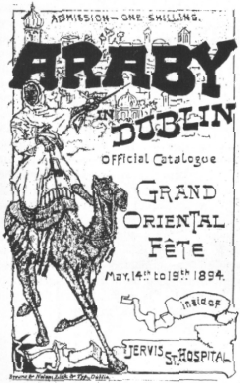
This was not the first time I had read Araby, however, this was the first time that I had really paid attention to it. I read it through twice, attempting to make sure I did not miss anything, but I cannot really guarantee that I found every detail in the story that is worth noticing. There were, however, a couple details that came to my attention. The first was towards the beginning of the story, in “dark odorous stables where a coachman smoothed and combed the horse or shook music from the buckled harness.” It struck me to wonder how one could, in shaking a harness, somehow have music fall from it. Was there some musical quality in a horse's tack that I had never noticed before? Perhaps this only refers to the jingling and shaking of the metal buckles, however, I refuse to take the most obvious solution. There is, I realized, a sort of a musical quality in everyday life, even in the sound of your own breathing and your footfalls as you trudge through life. Would it not make sense that this musicality extend to the rest of the world? I certainly found it understandable enough. The second thing that caught my attention was something that we mentioned in class, that is, the phrase killing time. The unnamed boy mentions that he wishes to annihilate the days left until his visit to the bazaar. It seems remarkable to me now that he is so eager for something to happen that he would wish to kill several days in order to skip ahead. However, I must admit that I have experienced this feeling before. There have been times when I wished I could just skip ahead to a better day, or through something that I knew I wasn't going to enjoy. But now I see what a waste it is! Why would anyone kill time? Every moment, every pulse that we have is a precious resource, one that we cannot buy, sell, or steal, and every pulse can be used for something important.

Unfortunately, I don't have quite as much to say about the other three stories. Cathedral was an uncomfortable story. I must admit that I was not sure what to think about the blind man. He made me almost as nervous as he did the husband. Even at the end of the story I was left with a vague sense of discomfort that I could not explain. The wife's attachment to the blind man was rather troubling to me. She had married two men and didn't seem to care about either of them as much as she cared about Robert. I had to wonder, perhaps along with her current husband, why she hadn't pursued a relationship with him from the first when he seemed to be such a prominent part of her life. I certainly understand that you do not love all of your friends in a romantic way, but this still didn't make sense to me. Or was it the story that did not understand me? Both copies of The Lady With The Pet Dog were, in my opinion, far more comfortable and heartwarming tales. The second one in particular made me happy, partly because I know exactly how the woman feels. It was not so much the writing style of Oates' story that made me prefer it—although it was easier to understand. Instead, it was that I identified more with the characters in her story. I know what it is like to feel guilty for loving someone, only to find out that it was the right thing to do after all. The moments of guilt when you wonder what would happen if he found out you were holding hands, touching another boy, and the times when all those thoughts are driven from your head and you know that no matter what anyone says, you've done something right for once. It might sting for a little while but in the end you know everyone will be better off for it. And that is all I have to say about that.
No comments:
Post a Comment